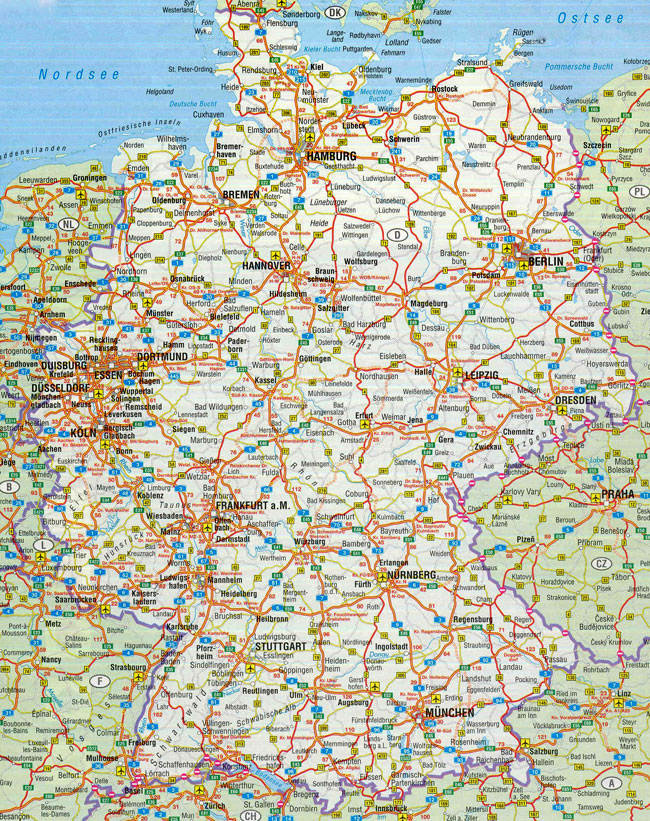Driving in Germany
The total length of roadways of Germany is 644,480 km, all of them are paved. Length of motorways - 12,917 km.
ContentsToll roads
In Germany, there is no charge for the use of roads. Payment is due to enter the center of some cities ("Umweltzone") and travel through two tunnels.
Ecological zones
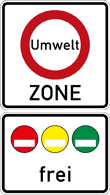
Since January 1, 2008, "Umweltzone" ecological zones have been created in many German cities to reduce fine airborne pollution.
The ecological zone is indicated by a road sign and an additional sign. The marking of vehicles with the special sign "Plakette" (sticker on the inside of the windshield), as well as the correct correlation of the sticker to the respective vehicle, are regulated by the Regulation on marking vehicles with less harmful substances (Marking Regulation). The sticker is valid in all environmental zones in all cities of Germany.
It is allowed to drive into the created ecological zones with a corresponding sticker. Thus, the appropriate sticker on the car must be available only to those drivers who want to enter the environmental zone.
A sticker is not required to enter in Germany.
The cost of a sticker for entering ecological zones is from € 5 to 15. Entering to ecological zone without a sign or without permission is not permitted as an exception (fine - € 80). The sticker can be obtained at technical inspection centers or at authorized garages.
Owners of foreign vehicles can obtain a sticker by filling out the appropriate electronic form on the website of the State Registration Authority in Berlin Berlin.de , attaching a copy of the vehicle registration certificate indicating emission standards or a manufacturer's certificate (preferably a PDF file).
After checking the documents, the registration authority sends the applicant an e-mail payment order, including bank details. A fee of € 6 will be charged for processing the documents and issuing the sticker. The sticker will be sent to the applicant by mail. Order processing can take from two to three weeks, so it is recommended to order a sticker in advance.
You can also get a sticker at the Vehicle Registration Office in Cologne by sending copies of your car documents and € 5 (in cash or by check) to Kfz-Zulassungsstelle, Max-Glomsda-Straße 4, D-51105 Köln. For more information visit www.stadt-koeln.de
Special toll
Warnowtunnel
The Warnow tunnel runs under the Warnow River and connects the east and west coasts north of Rostock. The tunnel has a length of 790 meters. It is the first toll road in modern Germany and was opened on September 12, 2003.
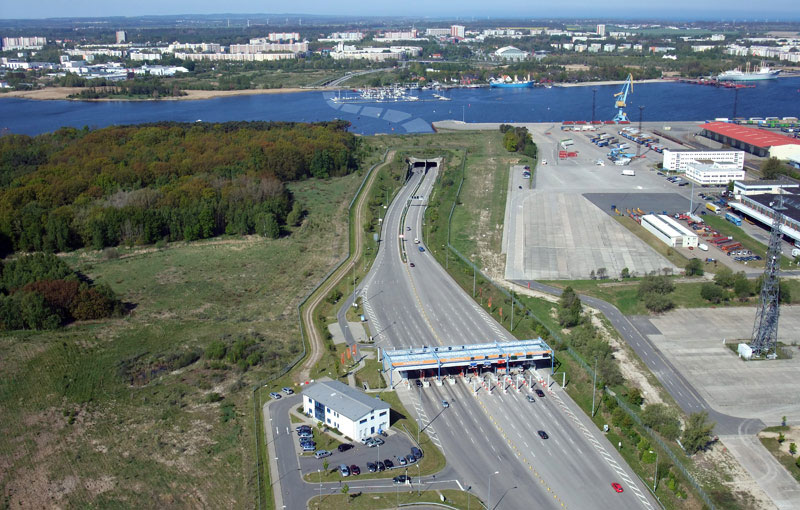
Tunnel location: Google Maps
Toll rate at 2023:| VEHICLE | HEIGHT | WINTER (01.11–30.04) | SUMMER (01.05–31.10) | |
|---|---|---|---|---|
| Motorcycle, Car, Car with a flat trailer | h ≤ 2.05 m | € 3.80 | € 4.70 | |
| Car with a high trailer, Compact van, Camper | 2.05 m < h < 2.60 m | € 4.40 | € 5.80 | |
If you do not have devices for automatic payment (RFID or Oscard), then you need to use lanes 2 or 3 for travel.
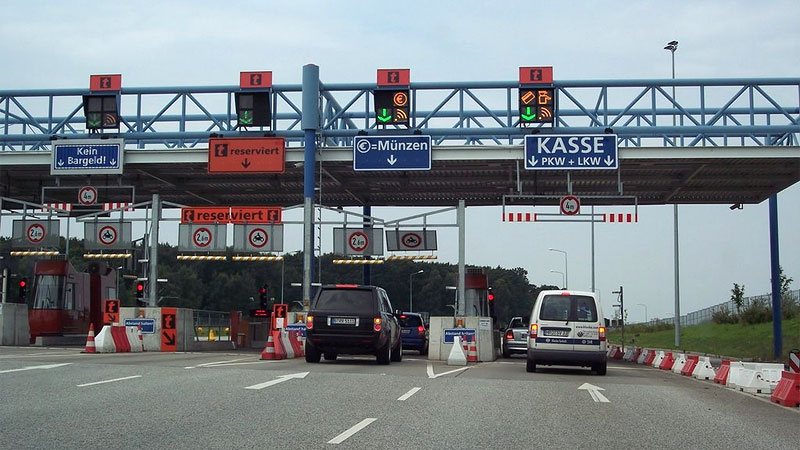
If you are driving on a 2nd lane, you can pay in cash. We do not accept € 100, € 200 and € 500 banknotes. Payment by credit card is only possible in the cash lane. If you pay by credit card for less than € 10, an additional fee of € 0.35 will be charged.
When driving on the 3rd lane, you can pay with coins in the machine. Coins of denomination of € 2, € 1, € 0.50, € 0.20 and € 0.10 are accepted for payment.
Please note that lanes 3 and 4 are not available for motorcyclists.
Herrentunnel
Herren tunnel runs under the river Trave and has a length of 780 meters. It is part of the Bundesstrasse 75 connecting Lübeck and Travemünde. This is the second paid tunnel in Germany. It was opened on August 26, 2005.
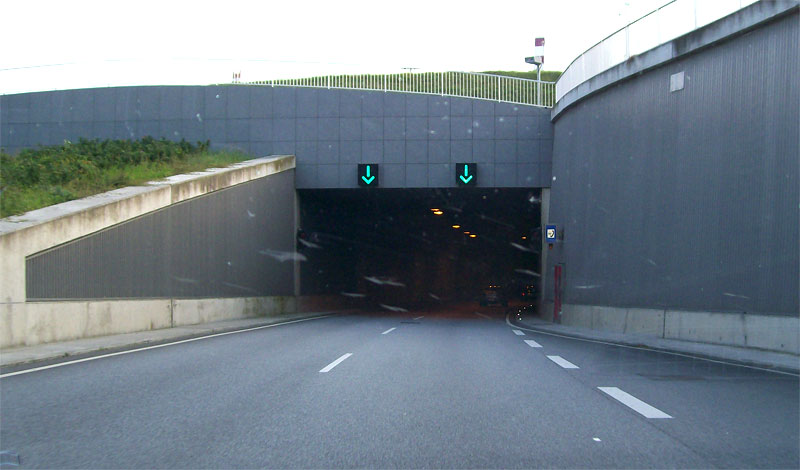
Tunnel location: Google Maps
Toll rate at 2023:| VEHICLE | HEIGHT * | TRAVEL PASS | CASH | |
|---|---|---|---|---|
| Motorcycle, Car, Car with a trailer | h ≤ 1.30 m | € 2.00 | € 2.10 | |
| Van, Lorry, Bus | h > 1.30 m | --- | € 3.90 | |
* height first axis.
To pay in cash, use the two right lanes. The following 2 lines are intended for payment by coins in the machine. The last lane is used to pay using automatic devices.
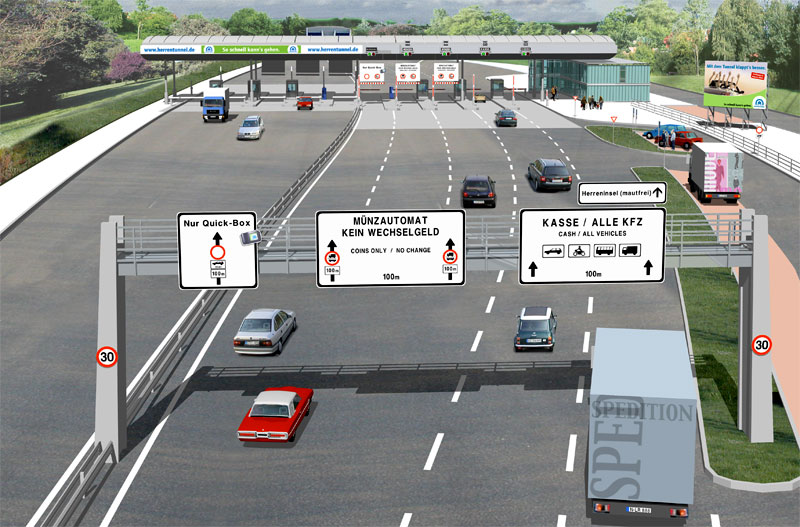
With automatic payment, coins with a value of 10 eurocents or more are accepted. When paying at the cash desk, banknotes of up to € 50 are accepted.
Roßfeldpanoramastraße
This alpine road runs through the Berchtesgaden National Park on the border of Germany and Austria. The road is 15.4 km long. The highest point is 1,570 m. The maximum slope of the road is 13%, and the vertical drop is 1,100 meters. The road passes among wonderful alpine meadows with magnificent surrounding views.
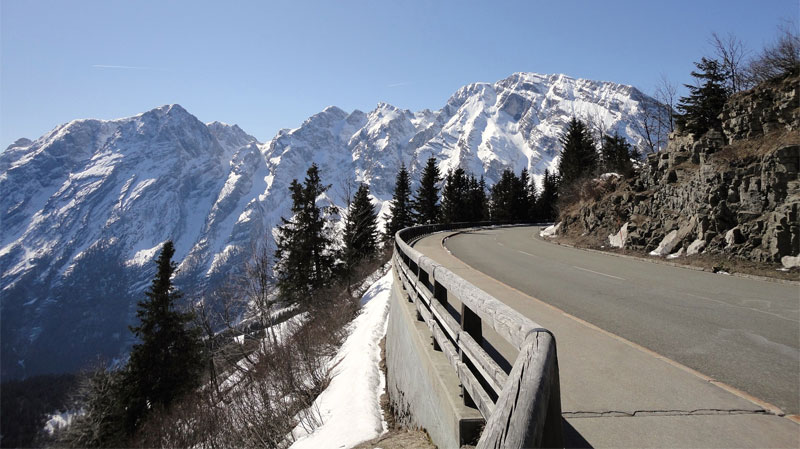
Road location: Google Maps
The road is open all year.
Toll rate at 2023:| VEHICLE | TARIFF (EURO) | |
|---|---|---|
| Motorbike including Rider and Passenger | € 5.00 | |
| Car including Driver and Passenger | € 8.50 | |
| Bus including Passenger | € 60.00 | |
More information about the road can be found on the site — Rossfeldpanoramastrasse
Parking in Germany
Parking in the restricted area is punishable by a fine. On some streets, parking is permitted only for local residents (Anwohnerparken or Anliegerfrei). Parking against traffic is prohibited.
Some parking lots require a parking disk (Parkscheibe), which can be purchased at gas stations. The disc should be visible under the windshield and show the arrival time.
At some car parks (Parkschein), you must take a ticket or plastic coins at the entrance. They are used for payment in the machine (usually located near pedestrian exits to the parking lot) before leaving the parking lot.
Penalties for violation of parking rules fixed by automatic time control:
- up to 30 minutes — € 10;
- up to one hour — € 15;
- up to two hours — € 20;
- up to three hours — € 25;
- more than three hours — € 30.
Germany road map
Germany road map (3.3 Mb).
Buy a Germany Road Map on Amazon
Road rules in Germany
Speed limits
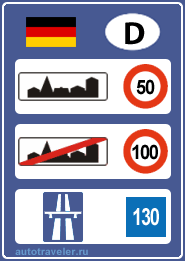
Standard speed limits in Germany (unless otherwise indicated on the signs)..
Cars (to 3.5 tons) and motorcycles:- built-up areas - 50 km/h
- outside built-up areas - 100 km/h
- motorway - 130 km/h (recommended)
- built-up areas - 50 km/h
- outside built-up areas - 80 km/h
- motorway - 80 km/h
It is forbidden to drive vehicles on motorways whose speed does not exceed 60 km/h in technical specifications.
For vehicles with snow chains the maximum permitted speed is 50 km/h.
Map of Germany's motorways showing the permitted speed (3.5 Mb).
The current maximum speed limits on the roads of European countries for cars.
Alcohol
The maximum permitted level of alcohol in the bloodstream is 0.3 ‰.
If the blood alcohol level is more than 0.3 ‰ and less than 0.5 ‰ and at the same time the driver has not committed any traffic violation, no punishment is provided.
If the level of alcohol in the bloodstream exceeds the allowable, a fine will be imposed:
If the blood alcohol level exceeds 0.5 ‰, then in the case of the first violation, the driver will be fined € 500. In case of repeated violation, the fine will be € 1,000 and suspended of the driver’s license for up to 3 months. The third time - € 1,500 and the suspended of a driver’s license for up to 3 months.
If the blood alcohol level exceeds 1.1 ‰, then, in addition to the fine, imprisonment of up to 6 months and suspended of a driver's license for up to 5 years are possible.
For drivers whose driver's experience is less than 2 years or whose age does not exceed 21 years, the permissible level of alcohol in the blood is 0.00 ‰. Fine - € 250.
The maximum permitted alcohol limit for drivers in European countries.
Dipped headlights
It is recommended to use dipped headlights all the time. The dipped headlights must be switched on in conditions of poor visibility caused by bad weather (fog, snow or rain).
Fine — € 25-60.
In which European countries is the use dipped headlights in daytime mandatory?
Children in cars
Children under 12 years old can only travel using suitable child restraint systems appropriate to their weight.
It is forbidden to transport children under 3 years old in vehicles that are not equipped with seat belts. Children over 3 years old and shorter than 150 cm can only be carried in such vehicles in the back seat.
For failure to comply with this rule, a fine of € 60 if one child is transported. In case of transportation of several children - € 70.
Seat belts
Seat belts is mandatory for both front and rear passengers.
Fine — € 30.
Mobile phone
It is forbidden to use a mobile phone while the vehicle is in motion, not equipped with a technical device that allows negotiating without using hands.
It is forbidden to take in your hands a mobile phone while the engine is running.
Fine — € 100.
Mobile phone while drivig in Europe
Penalties for using mobile phone while driving in Europian countries.
Window Tinting
The degree of light transmission of the windshield should be at least 75%, and the front side windows at least 70%.
Non-compliance with light transmission standards threatens road safety. In this case, the operation of the vehicle is prohibited until the cause is eliminated.
Fines
Police officers have the right to levy fines on the spot for minor traffic violations. If you do not have enough cash, you can pay with a credit card. If you cannot or do not want to pay (you have the legal right to do so), your vehicle may be confiscated.
Traffic fines in Germany:| Violation | Fine (EUR) | Note |
|---|---|---|
| Parking on pedestrian or bicycle paths | € 40 | |
| Parking in places designated for special vehicles | € 100 | |
| Tailgating | € 25-400 | depending on speed |
| Overtaking violation | € 80 | |
| Overtaking on the right | € 100 | outside built-up areas |
| Overtaking in the vicinity of the sign "Overtaking is prohibited" |
€ 150 | |
| Turn right on the green arrow without stopping in front of the traffic light | € 70 | |
| Don't stop on red traffic light | € 90 | The red signal glows no more than 1 second |
| Don't stop on red traffic light | € 200 | The red signal glows more than 1 second |
| Use of fog lights instead of dipped-beam headlights | € 10 | without fog |
| Driving in the opposite direction when driving on a motorway: - at the entrance / exit - on the side of the road - on the road |
€ 75 € 130 € 200 |
Keep in mind that if you refuse to pay a fine on the spot, the amount of the fine will be greater if you go to court. Some fines depend on your income.
Speeding fines for cars in Germany:| Over speed | ||
|---|---|---|
| up to 10 km/h | € 30 | € 20 |
| 11-15 km/h | € 50 | € 40 |
| 16-20 km/h | € 70 | € 60 |
| 21-25 km/h | € 115 | € 100 |
| 26-30 km/h | € 180 | € 150 |
| 31-40 km/h | € 260 | € 200 |
| 41-50 km/h | € 400 | € 320 |
| 51-60 km/h | € 560 | € 480 |
| 61-70 km/h | € 700 | € 600 |
| above 70 km/h | € 800 | € 700 |
The tolerance in measuring speed is 3 km/h at a speed of less than 100 km/h, and 3% at a speed of over 100 km/h.
Useful information
Fuel prices
Unleaded gasoline (95 and 98) and diesel fuel are available in Germany. Leaded gasoline is absent. There are LPG stations (over 5,000).
Average prices for all types of fuel at 2026-02-11:
- E10 — € 1.670
- Super (95) — € 1.724
- Super Plus (98) — € 1.750
- Diesel — € 1.578
- LPG — € 1.029
Trends gasoline prices in Germany for last years.
In the country, it is allowed to carry gasoline in cans in a car.
Currently in Germany, E10 gasoline (containing 10% ethanol) is widely used, but it is not suitable for all vehicles. Use it only if you are sure that it is suitable for your car (contact the car manufacturer or see this list (86 Kb) published by the Association of European Car Manufacturers).
Map of the location of fuel stations in German (555 Kb).
List of fuel stations, including their working hours in German (483 Kb).
List of LPG stations in German (3.5 Mb).
Changes from the previous period are shown. Update every two weeks.
Emergency phone numbers
- European emergency number - 112
- Ambulance - 112
- Police - 110
- Fire - 112
Compulsory to carry in car
Equipment you need to have in your car:
- Reflective jacket — From July 1, 2014, it is necessary to have a reflective jacket (complying with European standards EN471), which should be used in the event of an emergency stop. The driver must show the jacket while checking on the road. This rule does not apply to mopeds/motorbikes. Fine — € 15.
Winter equipment
Winter tires
When appropriate weather conditions (snow, slush, ice on the road) occur, vehicles with a total weight of up to 3.5 tons must be equipped with winter tires.
Winter or all-season tires intended for use in winter conditions must be marked "M + S", a mountain peak mark with three peaks and with a snowflake inside it.
If during this period the vehicle is not equipped with winter tires, the offender will be fined € 60. And if obstacles are created for other drivers, the fine will increase to € 80.
Spiked tires
The use of studded tires is prohibited, with the exception of a small section of Bad Reichenhall - Lofer near the Austrian border.
Snow chains
It is allowed to use snow chains if the appropriate traffic sign is installed.
Winter equipment for car in Europe
Requirements for using of winter and studded tires in different countries of Europe.
Optional equipment and other rules
It is recommended to have a set of spare lamps, a first-aid kit, warning triangle. First aid kit and warning triangle are required for residents.
A function indicating the location of fixed speed cameras in GPS-based navigation software must be deactivated.
The use of radar detectors is prohibited. Fine — € 75.
